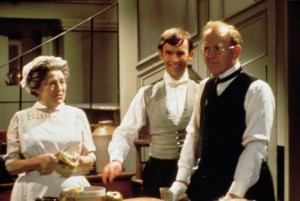
Talking about Netflix in a recent interview with the Toronto Star, Kevin Spacey made this comment: “For kids growing up, there’s no difference among watching Avatar on an iPad or watching YouTube on a TV or watching Game of Thrones on their smartphone. It’s all content. It’s all story.” It doesn’t sound right, does it? Is among the culprit? If we look at exactly why it sounds wrong, it starts getting complicated…
Most of us remember from grammar lessons the notion that between is appropriate for two items, and among is for three or more. That’s presumably what made Spacey (or the paper’s copy-editor) choose the latter word. If it’s really that simple, then Spacey’s comment shouldn’t grate on the ears, should it? But it does, and that’s because it isn’t that simple.
Strunk & White tried to explain it this way: “When more than two things or persons are involved, among is usually called for: ‘The money was divided among the four players.’ When, however, more than two are involved but each is considered individually, between is preferred: ‘an agreement between the six heirs.'” That doesn’t seem like a great explanation to me: I’m sure each of the four players was considered individually when the money was divided, and I’ll bet at least one of those six heirs wasn’t considered individually when the agreement was made! There’s something here that I’m still not getting.
Eric Partridge, in his book usage and abusage, presents it this way: “One divides money, goods, property between two persons, but among three or more. The distinction, however, is not so simple. When speaking either of group action, or of precise spatial relationship, one must use between however many participants are involved; as in ‘The children raised $25 between them’, or ‘Switzerland lies between France, Germany, Austria, Liechtenstein and Italy.'” Ah: so because the division of money among Strunk & White’s players wasn’t a group action as such, but the heirs’ agreement was, this begins to make sense. But I’m still not sure I understand completely.
Here’s Fowler on the subject (with my bolding): “The OED gives a warning against the superstition that between can be used only of the relationship between two things, and that if there are more, among is the right preposition. ‘In all senses between has been, from its earliest appearance, extended to more than two . . . It is still the only word available to express the relation of a thing to many surrounding things severally and individually; among expresses a relation to them collectively and vaguely: we should not say the space lying among the three points or a treaty among three Powers.‘ But the superstition dies hard. Seventy years after those words were written the following sentence cannot escape suspicion of being under its influence: The peaceful, independent, and self-governing status of Cyprus is conditional on the continuance of cordial relations among Britain, Greece, and Turkey.”
Grammar Girl distills the idea quite well, saying, “You can use the word “between” when you are talking about distinct, individual items even if there are more than two of them. For example, you could say, ‘She chose between Harvard, Brown, and Yale’ because the colleges are individual items. … On the other hand, you use “among” when you are talking about things that aren’t distinct items or individuals; for example, if you were talking about colleges collectively you could say, ‘She chose among the Ivy League schools.'” And to add to Grammar Girl’s last example, if you said that “she chose between the Ivy League schools”, that would surely suggest that there are only two such institutions.
Going back to Kevin Spacey’s comment, and taking into account everything said above, it does seem to follow that he could have chosen between when comparing the three distinct and individual watching experiences: there’s no group action or spatial relationship at play here, and there’s nothing vague or collective about the items he’s comparing. Let’s try substituting Spacey’s among with between and see how it sounds: “For kids growing up, there’s no difference between watching Avatar on an iPad or watching YouTube on a TV or watching Game of Thrones on their smartphone. It’s all content.” Hmmm: that still sounds wrong. Why?
There is another important factor to consider. It’s the word that goes “between” the two or more items under discussion: this should, in fact, only ever be and, at least when between is in play. Fowler has strong words to say about the very common mistake — when employing a between clause — of using connective words other than and, such as or, against, or to. “In the commonest use of between, i.e. where two terms are separately specified, the one and only right connexion between those terms is and. But writers indulge in all sorts of freaks; the more exceptional and absurd of these, in which against, whereas, and to are experimented with, are illustrated in: He distinguishes between certain functions for which full and rigorous training is necessary, whereas others can very well be discharged by me who have had only the limited training. / Societies with membership between one thousand to five thousand. These are freaks or accidents…”
So, what if we keep between in Spacey’s comment and change all his ‘or‘s to ‘and‘s? “For kids growing up, there’s no difference between watching Avatar on an iPad and watching YouTube on a TV and watching Game of Thrones on their smartphone. It’s all content.”
That seems good, doesn’t it? Well, he does seem to suggest that all kids growing up are sharing just one smartphone: but that’s another discussion for another post …








